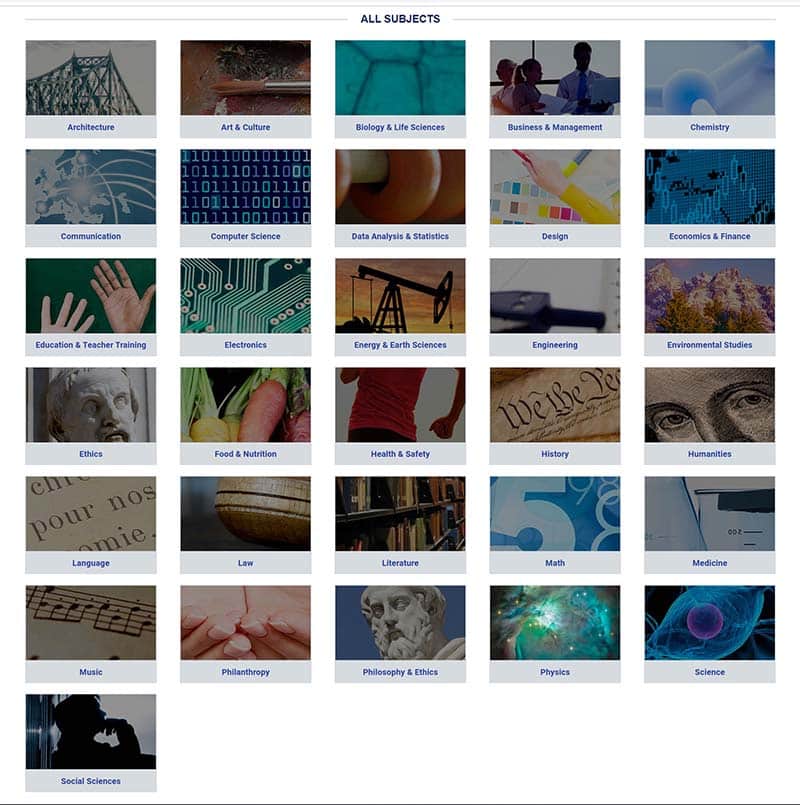With its reputable founder, open-source infrastructure, and nonprofit business model, edX seems highly promising as an e-learning platform at first sight. However, there is much, much more to edX than just their free course catalogs. In this edX review, I will dig deeper into the online learning platform in order to find out about all it has to offer.
Table of Contents
EdX review introduction
A joint effort between MIT and Harvard University, edX was created in 2012 with the aim of bringing free online learning materials to the masses. The founder and CEO of edX is Anant Agarwal, a computer science professor from MIT who earned the prestigious Yidan Prize for Educational Research in 2018.
The first thing that sets edX apart from other similar e-learning platforms is that it is a non-profit and open-source organization. These two factors, particularly the non-profit business model, have largely affected their methods of monetization, and potentially their course catalog. After all, universities are more likely to develop new courses on e-learning platforms if they have a monetary incentive to do so. With edX, the profit gained from courses is a bit complicated, as oftentimes the entire course material is given away for free.
For students from low-income countries, though, the free courses on edX have become an undeniably high-value asset. All other online learning platforms besides edX have decided to go down the route of staying for-profit companies. As a result, edX truly has a unique place amongst modern e-learning platforms.
In this edX review, I will cover all of the major educational services which they provide, in order to provide a comprehensive overview of the platform.
Overview of edX
EdX provides students with a large number of study options and a broad range of available courses from various subjects. While edX tends to focus mostly on STEM education, they do also have a number of learning materials on subjects such as communication, language, and Law. In order to get a complete overview of all the subjects taught on edX, refer to the edX subjects page.
While online courses are the most popular types of learning tools used on edX, they are certainly not all that edX has in their arsenal. I would argue that their most innovative and useful learning assets are their MicroMasters programs. These programs are edX-exclusive and they are hybrids between bachelor’s and master’s degrees. I will cover my thoughts on these programs further up in this review of edX, though, so I will not stop for long on MicroMasters for now.
Besides online courses and MicroMasters, edX also offers online master’s degrees, professional certificates, and selections of related courses assembled into Xseries packages. Additionally, they have a platform called edX for Business which offers corporative e-learning solutions to businesses.
In addition, edX offers a unique opportunity to take part in a partnership with Arizona State University. Dubbed the Global Freshman Academy, this program allows online students to earn transferable credit from edX courses which can then be used during college studies.
As it appears, edX offers quite a wide range of services on its platform. Online courses are just one part (albeit a large part) of it. I would recommend you not to limit yourself to just online courses. There is much value to be gained from edX’s other services as well.
Next up in this review of edX, I will go into more detail on these services in order to give you a better idea of what they offer and whether they are worth using.
Review of edX Online Courses
he most popular and widely used learning tools on edX are online courses. As mentioned above, edX is unique in that it allows users free access to all of its courses, albeit with some features such as graded assignments and certificates being behind a paywall.
With a wide range of online courses to choose from (more than 30 topics), edX has managed to cover most of the major subjects in education. Students interested in STEM subjects will find especially high value from edX, as the selection of courses available in science, technology, engineering, and mathematics topics is considerably higher than for other subjects.
In this picture, you can see the different types of online course topics available on edX.org:

If you would like to explore these course subjects on your own, navigate to the edX Subjects page.
Pricing of edX Online Courses
All edX students can pick a course for free and access the video materials, lectures, and discussion boards at no cost. These kinds of free learning materials are an excellent way of being taught topics by some of the world’s best universities such as Harvard and MIT. Those familiar with online course platforms will realize how unique edX is in this regard – there are no other platforms out there with as wide of a choice of free online courses as edX has.
If you would like to see all of the free courses offered on edX, simply do a search for all the courses – most of the courses can be audited for free.

As of the writing of this review, a quick search like this yields more than 3700 results, all of which are high-quality courses offered for free by the world’s top universities. These courses are an excellent starting point for anyone wishing to explore the possibilities of e-learning without having to make a monetary investment.
However, you might be wondering about that paywall I mentioned earlier. Let’s have a look.
What content is paywalled on edX?
Despite being a nonprofit, edX does offer a paid version for all of its online courses. This so-called “paywall” was implemented in 2018, in an effort to generate more revenue and perhaps to motivate partner universities to publish more courses. After all, universities function similarly to most businesses, in that they want to see a positive return-on-investment whenever possible. If they spend resources on developing an online course, then naturally it’s in their best interest not to give it away for free.
However, you might be left wondering – if I can access all of the course materials for free on edX – then why would I ever pay for the courses?
Well, it turns out that each online course offered on edX has two different versions, or “tracks” as they are referred to as by edX. These two tracks are:
- Audit Tracks (Free)
- Verified Tracks (Paid)
The course materials for both of these two tracks are identical. If you don’t pay for the Verified Track, you will still get access to all the same course materials, instructors and videos as a paying student would. This means that technically all courses on edX still remain free.
However, paying for an online course on edX brings some significant advantages:
- Certificates of completion
- Graded assessments
- Unlimited course access
Certificates of completion
All Verified Track students who graduate their course on edX get a certificate of completion from the institution which created the course. It goes without saying that a certificate from Harvard, MIT or IBM is often worth the extra spend in case you might want to feature it on your LinkedIn profile or CV.
Graded assessments
In order to get your certificate of completion, you must first pass a graded assignment that tests you on the knowledge acquired throughout the online course. There is a reason why traditional universities are often centered around graded assessments. Grades can be measured objectively and they give students concrete goals to work towards. Without a graded assessment, it’s difficult for a potential employer to take a completed online course seriously, as the student has no real evidence of mastering the material taught during the course. Non-paying students don’t get access to graded assessments, which is a bit of a shame as the quizzes and assessments on edX courses are some of the best out there. They are detailed, easy to navigate, and they help solidify the knowledge gained throughout a course.
Unlimited course access
This is perhaps one of the biggest motivators for me when choosing to pay for online courses on edX. That is because, in the case of the free Audit Track, you only have access to the course materials for a predetermined amount of time equivalent to the amount of average time students need to finish the course. For example, this time frame might be 3-4 weeks. After this time period ends, you will no longer have access to the materials unless you pay for the Verified Track. Having the ability to reaccess course materials months and years after taking the course ensures that you get the most value out of your learning experience. Theoretically, you could just go back to the notes you took yourself while studying, but unless you are very efficient at notetaking you will likely skip over some important details.
If you would like to read more on the differences between the free and paid versions of edX online courses, refer to this support answer from Deb Chatigny.
As for the price of getting the Verified Track, it depends largely on the specific course you choose. Generally, it generally ranges from $30 to $350, depending on the complexity of the course and the institution which teaches it. You will find the price of the Verified Track on the right side of the course page together with other details.
Are courses on edX worth it?
Yes, online courses on edX definitely are worth taking, as they offer excellent value for students. Almost all of the online courses on edX can be accessed for free, and they are created by some of the world’s best universities. Whether paying for a course is worth it for you is more difficult to answer, as it depends on what you are looking to get out of the online course you are taking.
Next up in this review of edX I will cover MicroMasters, which go considerably deeper on the study topics than courses. If you’re considering paying for a course to get a certificate of completion, then you might also want to consider studying in one of edX’s many MicroMasters programs.
Review of edX MicroMasters Programs
MicroMasters programs are fully online graduate-level courses that serve as a bridge between a bachelor’s degree and a master’s degree. MicroMasters are exclusive to edX and they were designed for students who wish to further their education without having to commit the same time, effort, and monetary investment which a traditional master’s degree would require. In terms of content, a single MicroMasters program is usually equivalent to around 25-50% of a regular master’s degree. However, in some cases, MicroMasters programs can even surpass traditional master’s degrees in content and length.
If you want to hear it from the man himself, here is a short interview with Anant Agarwal, CEO of edX, where he explains how MicroMasters programs work:
Considering the fact that the cost of enrolling in a MicroMasters program is only a tiny fraction of what a full-sized master’s degree would cost, it becomes evident that they are some of the most cost-effective methods of furthering one’s education online. They are rich in content, flexible, institution-backed, and edX even offers students the chance to try out a MicroMasters program before committing to a purchase.
MicroMasters vs. Online Master’s Degrees
MicroMasters programs were not designed to replace master’s degrees. They do, however, share many similarities. This is why I felt it was appropriate to make a comparison of the two in order to give my opinion on which of the two study options offers online students better value.
Let’s take an example for comparison. First up, I will highlight a hybrid master’s degree which takes place partly online. After it, I will show a fully online MicroMasters program on a similar topic. Let’s see how they compare:
Michigan State University (MSU), the world’s #144 university according to the World University Ranking of 2020, offers a full-sized hybrid online master’s degree in Supply Chain Management. Students who wish to enroll in the program should have 2 years minimum professional working experience in supply chain management, a bachelor’s degree, and a minimum GPA of 3.0 in order to qualify. The program lasts 2 years and cannot be taken entirely online as it requires face-to-face learning sessions together with the online sessions in order to graduate.
How much does it cost? $16,764.
Massachusetts Institute of Technology (MIT), the world’s #1 university according to the World University Ranking of 2020, offers a MicroMasters program in Supply Chain Management. The program is endorsed by Walmart and it’s led by some of the industry’s most well-respected researchers such as Chris Caplice and Bruce C. Arntzen. The program lasts 1 year and 8 months with a time commitment of 8-12 hours per week, which gives it roughly the same duration as the aforementioned master’s degree. The program has no direct prerequisites and edX gives students a chance to try out the program before having to pay for it.
How much does it cost? $1,694.
Which of these two options seems preferable to you?
A traditional full-sized master’s degree is still oftentimes a worthwhile investment of time and money. Being able to pursue a Ph.D. is perhaps the most important difference between the two. After all, completing a MicroMasters will not give you a traditional degree which could be used to apply for a Ph.D.
However, to me, programs such as this MicroMasters offered by MIT seem to offer considerably better “bang for the buck” than a traditional master’s degree. If my goal was to complete a Ph.D. in as little time as possible, then I would certainly go with a normal master’s degree. However, in almost all other scenarios, I would pick the MicroMasters over a master’s degree. After all, I can use a completed MicroMasters to ease my way into a regular master’s degree if I wish to do so later on.
Each person is different though, and depending on your learning goals your preferences in this regard will change accordingly. I will let you be the judge, but I hope this comparison at least gave you some food for thought.
Review of edX Online Degrees
Obtaining a fully certified and complete online degree on edX is a step above the MicroMasters programs I talked about previously. Similarly to Micromasters programs, though, online degrees on edX are offered by famous universities. This time, however, graduation results in a full-fledged Master’s degree rather than a certificate of completion.
Why only a Master’s degree? Well, that is because edX does not yet offer any online bachelor’s degree programs on its platform. They have chosen to focus on online Master’s degrees for now, with 11 options currently to choose from, and another 13 upcoming.
As of right now, the online Master’s degrees offered on edX include:
- Leadership: Service Innovation (University of Queensland)
- Business Administration (Boston University)
- Information Technology (IT) Management (Indiana University)
- Accounting (Indiana University)
- Cybersecurity (Georgia Tech)
- Analytics (Georgia Tech)
- Marketing (Curtin University)
- Supply Chain Management (Arizona State University)
- Computer Science (The University of Texas at Austin)
- Data Science (The University of California, San Diego)
All of these master’s degrees take place fully online, and anywhere from 1-4 years to complete on average.
To see the full list of available and upcoming online degrees offered on edX, click here.
Pricing of edX Online Degrees
The costs of the online master’s degrees offered on edX depend on which specific program you choose. Prices for some of them start off at the higher end of $9000, while others cost $24000 or more.
These prices may seem daunting at first – these are considerable sums of money after all. However, consider the fact that regular on-campus master’s degrees in the USA can cost anywhere from $30000 to $120000. That is excluding costs of travel, accommodation, textbooks, and all other expenses related to studying in a traditional university. Read my article on the advantages of e-learning if you’re interested in finding out more about why I prefer e-learning over on-campus studies.
However, how does the pricing of edX’s online degrees compare to other similar e-learning platforms such as Coursera? Let’s dig deeper and find out.
In order to make a fair comparison, let’s take two similar online degrees from universities based in the US. Both Coursera and edX offer fully online master’s degrees in Data Science, so let’s use that as our example in order to make a direct comparison.
Coursera offers a Data Science degree from the University of Illinois at Urbana-Champaign (#31 in World University Rankings for Computer Science). The program takes 1-3 years to complete, consists of a total of 32 credit hours and costs $21,440.
edX offers a similar Data Science degree from the University of Texas at Austin (#29 in World University Rankings for Computer Science). The program takes 1.5-3 years to complete, consists of a total of 30 credit hours and costs $10,000.
So, which is a better deal? Both universities have virtually the same Computer Science ranking. While edX’s Data Science course has 2 fewer credit hours, it has a price tag of less than half than the one offered through Coursera. Taking this into consideration, I would say that based on numbers alone, edX offers better value for the money.
However, what’s much more important than pure numbers and rankings are your individual interests and study paths. Both of these two examples may be data science degrees, but they do have subtle differences in their curriculums. Make sure to take the time to read the actual curriculum of the degrees you are interested in. I would recommend you to make a choice mainly based on that. In the end, it’s up to you to decide which degree is a better suit for you – don’t get stuck on the numbers.
Before taking a dive into other online reviews of edX, let’s first highlight some of the key advantages and disadvantages of the edX e-learning platform.
Online Reviews of edX
I found numerous other reviews of edX online, so in this section, I will highlight some of the points which other reviewers have mentioned. While I don’t necessarily agree with some of the statements, I felt it was still important to feature the opinions of other reviewers in order to provide a more comprehensive review of the edX online learning platform.
Positive Reviews
There have been many positive things said about the edX platform in previous reviews.
PCMag highlighted edX’s large catalog of courses and video transcripts as some of the major pros of the edX platform.
ElearnScanner’s review of the platform brought out a wide range of choice, user-friendly forums, self-pacing, and engagedness as some of the more noteworthy advantages of the edX e-learning platform.
BitDegree, being online course providers themselves, did their own review and highlighted edX well-established reputation, easy navigation and university-level courses as some of the major advantages in their review of edX.
Negative Reviews
While the major consensus of edX on the Internet seems to be positive, other reviewers have highlighted some negative aspects of the platform. Let’s take a closer look:
In their review, BitDegree highlighted that some of the platform’s courses have high prices and poor quality. Additionally, they brought out that the platform can be akin to crashing.
ClassCentral’s 2018 year-in-review of the platform brought out a good point that the graded assignments paywall for edX’s online courses was implemented only in 2018. According to them, the move is a result of edX trying to find new methods of monetizing their online courses.
Finally, Edukatico singled out complicated navigability and confusing course archival methods as potential disadvantages of the platform.
Advantages (Pros) of edX
Excellent pricing of MOOCs
If there’s one single thing that edX gets right, it’s their pricing. Not only are most courses free to audit, but those which do come with a cost tend to be very affordable. Compared to the other online learning platforms, edX offers great value for your money.
Courses from the world's top universities
With courses from universities such as MIT, Harvard, and Cambridge, edX is the perfect place to find high-quality courses which you can’t get anywhere else. While other online learning platforms such as GetSmarter also have courses from top universities such as MIT, edX has a much more comprehensive catalog and far better pricing. Thus, if Ivy-League education in the shape of a MOOC is what you’re looking for, edX is definitely the place to go.
Large catalog of free courses
Not only does edX have a massive catalog of thousands of courses, but a large number of these courses are available for free. This is perfect if you’re looking to try out a new course or learn something new without having to commit any money.
Online degrees are fairly priced
I avoided using words such as “cheap” or “inexpensive” here because the online degrees on edX can still cost tens of thousands of dollars. But, if you compare these prices to traditional degrees or even other online degree platforms, you’ll quickly realize that the pricing of edX’s online degrees is more than fair.
High-quality corporate solutions
As far as corporate e-learning goes, edX has a sterling reputation. Fortune 500 companies and other large businesses have been using edX’s corporate solutions for years now with great success, and with the recent acquisition by 2U, I think that the strength of their corporate services will only continue to thrive from here on out.
Disadvantages (Cons) of edX
Some course features are behind a paywall
While most of edX’s courses are free to audit, it’s worth considering that some features (such as graded assignments and certificates of completion) are often behind a paywall. Unless you pay, you will not have full access to all the features of a course.
Discussion forums are difficult to navigate
Another disadvantage worth considering is that the edX course discussion forums are not as user-friendly as on some other platforms. While this is not a major issue, it’s worth mentioning as it can be a bit frustrating when trying to get help from other students or find specific information.
Review conclusion: is edX worth it?
edX is a unique online learning platform in today’s e-learning landscape. It has stayed non-profit since its launch, and it has a large number of education institution partners. As a result, edX has by far the best selection of high-quality free online courses on the market today.
Graded assignments and certificates for their online courses were hit with a paywall, which is a shame for the students. However, as all of the course materials are still freely accessible I can’t say that this change is any kind of a dealbreaker for me personally. I like to support course content creators when I get the chance, in any case.
Perhaps the most noteworthy weapons in edX’s arsenal, though, are their MicroMasters programs. In the case of MicroMasters, you can enroll in a long-term, intensive and high-quality graduate-level course for the fraction of a price of a full-sized master’s degree (less than ~5% of the cost). And, you can do so without the usual prerequisites that come with a regular master’s program such as relevant work experience and a bachelor’s degree. I would say taking a MicroMasters is sort of like reaping all the benefits from a master’s degree, without having to deal with the major drawbacks.
There are also 11 online degrees currently offered on edX, with 13 more on the way. They have good pricing and top educational institutions backing them. However, for most people, I would still recommend going with a MicroMasters program instead of a full-fledged master’s degree due to cost, flexibility, lower prerequisites, and the ability to test out a program before buying it. You can always use the credits from a MicroMasters to jumpstart your learning path during a master’s degree later on if you wish to.
All in all, edX still continues to be the best resource for free online courses, and their paid programs are definitely worth checking out as well. Alternative online learning platforms such as Udemy and Coursera may have an overall larger catalog of courses, but they don’t have MicroMasters, or as wide of a selection of free resources as edX does.
I hope you enjoyed this edX review. If you liked what you read, be sure to check out more of our upcoming e-learning platform reviews. Never stop learning!



